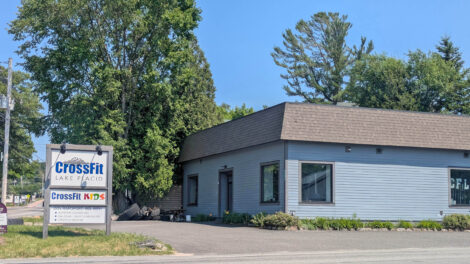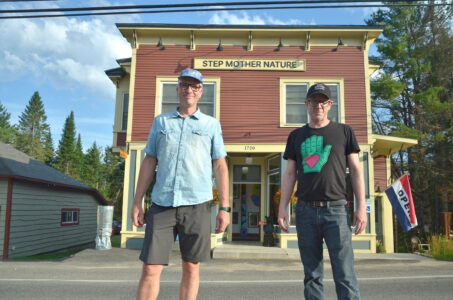Phase 3 guidelines available
North Country still in Phase 2 until governor gives OK

Coronavirus (Image provided by U.S. Centers for Disease Control and Prevention)
As businesses in five regions of New York await the governor’s decision to allow them to enter Phase 3 of reopening the state’s economy — possibly on Friday — the New York Forward website has been updated to include guidelines for Phase 3 businesses that offer food and personal care services.
Two industries will be part of Phase 3: food services and personal care services.
Restaurants and bars were allowed to start outdoor dining options on June 4, and Phase 3 will include inside dining. They’ve been able to serve take-out since inside dining was prohibited the evening of March 16.
Guidance for personal care services applies to non-hair-related businesses including tattoo and piercing facilities, appearance enhancement practitioners, massage therapy, spas, cosmetology, nail specialty, UV and non-UV tanning, or waxing.
“As more regions across the state continue with the reopening process, New Yorkers should remember it was because of their hard work that we have been able to bend the curve and reopen this quickly, and all individuals should continue to follow the necessary guidelines and precautions to help prevent a renewed increase in the spread of the virus,” Gov. Andrew Cuomo said Tuesday.
On May 15, the first five regions to begin reopening their economies were the North Country, Finger Lakes, Central New York, Southern Tier and Mohawk Valley. They all moved to Phase 2 on May 29 and could enter Phase 3 on Friday if they meet the state’s seven health-related metrics and are cleared by international experts, and ultimately if the governor gives his OK.
Meanwhile, New York City entered Phase 1 of reopening and the Mid-Hudson region entered Phase 2 on Tuesday, while Long Island will enter Phase 2 on Wednesday. Western New York entered Phase 2 on June 2, and the Capital Region began Phase 2 on June 3.
Below are some of the mandatory guidelines for reopening in Phase 3. For a full list of the mandatory and best recommended practices, visit the New York Forward website at https://forward.ny.gov/phase-three-industries.
—
Food services
—
• Limit indoor capacity to no more than 50% of maximum occupancy, exclusive of employees.
• Limit outdoor capacity to the number of tables that can be safely and appropriately arranged, such that each table is a minimum of 6 feet away from another. All indoor and outdoor tables with seating for customers must be separated by a minimum of 6 feet in all directions. Wherever distancing is not feasible between tables, physical barriers must be enacted between such tables. Barriers must be at least 5 feet in height and not block emergency and/or fire exits.
• Regardless of physical distance, employees must wear an acceptable face covering at all times.
• Patrons must wear face coverings at all times except while seated, provided that the patron is over the age of 2 and able to medically tolerate such covering.
• Individuals seated at the same table must be members of the same party (but may be from different households), with a maximum of 10 people per table. Seating in bar areas and communal tables is only permitted if at least 6 feet can be maintained between parties.
• Clearly signal 6-feet spacing in any lines for customers waiting to order, pick up food, be seated or use the restroom, as well as in any pick-up or payment location.
• Designate entrances and exits for customers and separate entrances and exits for employees, where possible.
• Limit in-person gatherings (e.g. staff meetings) to the greatest extent possible.
• Ensure all staff wear face coverings at all times, and that they practice hand hygiene and use bare hand barriers consistent with state and local sanitary codes.
• Ensure all condiments provided directly to customers are in single-use disposable containers or reusable containers that are regularly cleaned/disinfected.
• If non-disposable menus are used, clean and disinfect the menus between each party’s use.
• Use pre-packaged silverware or pre-rolled silverware. Silverware must be pre-rolled while wearing masks and gloves.
• Implement mandatory daily health screening practices (e.g. questionnaire, temperature check) of their employees and, where practicable, vendors, but such screening shall not be mandated for customers and delivery personnel.
—
Personal care services
—
• Limit the workforce and customer presence to no more than 50% of the maximum occupancy, inclusive of customers, who must maintain 6 feet of separation from others, except during the service, and, in all cases, only be permitted entry if wearing an acceptable face covering, provided that the customer is over age 2 and medically able to tolerate one.
• Ensure 6 feet of distance between individuals at all times, unless safety or the core activity requires a shorter distance (such as performing a piercing or tattoo, providing a massage, performing a manicure or pedicure). Employees must wear face coverings any time they interact with customers (e.g. performing a service, ringing up a purchase) and any time they come within 6 feet of another person.
• Ensure that customer seating allows customers to maintain a 6-foot distance from all others except for the employee providing service (e.g. tattoo and piercing workstations, massage tables or salon workstations must be 6 feet apart from each other), unless a physical barrier is in place in accordance with federal Occupational Safety and Health Administration guidelines.
• Ensure that employees at appointment desks and cash registers maintain 6 feet of distance from others, unless there is a physical barrier (e.g. plexiglass) between them, or the employee is wearing a face covering; however, even with a barrier, employees must wear a face covering any time they interact with a customer.
• Close waiting rooms.
• Put in place practices for adequate social distancing in small areas, such as restrooms and break rooms.
• Personal care services that require customers to remove face coverings (e.g. lip or nose piercings, face massage, facials, lip or nose waxing) are prohibited.
• Customers must only be permitted entry into the facility if they wear an acceptable face covering, provided that the customer is over the age of 2 and able to medically tolerate such a covering.
• Employees must wear a face covering that completely covers the nose and mouth and a face shield or safety goggles when providing service directly to customers.
• Employees must wear face coverings any time they interact with customers, even if they are 6 feet or more apart.
• Tattoo and piercing facilities must ensure that all employees wear a surgical mask that completely covers the nose and mouth, eye protection (goggles and/or face shield), and disposable gloves when providing service directly to/on customers.
• Face coverings must be cleaned and disinfected or replaced after use or when damaged or soiled, may not be shared, and should be properly stored or discarded.
• Employees shall be tested for COVID-19 through a diagnostic test every 14 days, so long as the region in which the personal care workplace is located remains in Phase 3 of the state’s reopening.
• Implement mandatory health screening assessment (e.g. questionnaire, temperature check) for employees and, where practicable, vendors, but such screenings shall not be mandated for customers and delivery personnel.




